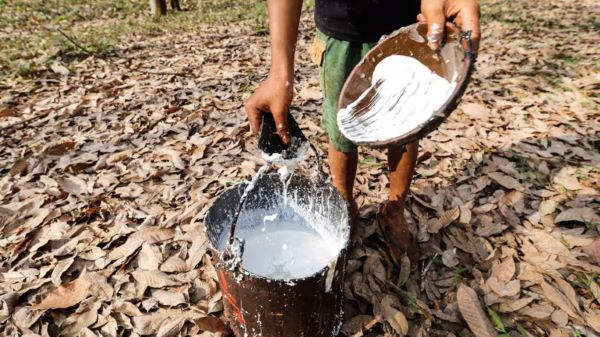
European Union rules aimed at stopping deforestation threaten widespread disruption for Southeast Asia's rubber sector, from Cambodia's 30,000 small farmers to major exporters in Thailand and Malaysia.
The EU's deforestation regulation (EUDR) aims to ban imports of seven commodities -- cattle, cocoa, coffee, palm oil, rubber, soy and wood items -- if they come from land that was deforested after Dec. 31, 2020.
Companies dealing in such imports will have to provide "conclusive and verifiable information" mapping their supply chains, including geolocation data for where products were grown, to ensure products are compliant. Compliance will become mandatory in December 2024 for larger companies and in June 2025 for smaller ones.
The concern for Southeast Asia, critics say, is that these requirements will disproportionately hurt small farmers while failing to adequately address rubber's role in deforestation.
Jean-Christophe Diepart, a geo-agronomist based in Cambodia, said there will be "profound implications" for the country's farmers.
"The risk is that basically the smallholders will be dropped because there are too many requirements and it's too much effort to monitor and trace the rubber they will produce", Depart said. That would just leave "large corporations who have the resources to comply".
Similar concerns are growing in Malaysia. The country joined Indonesia to negotiate with the EU over the deforestation rules, as the two are concerned about the impact on their palm oil industries. But Malaysia's $2 billion rubber export industry also stands to be affected.
The country ships about 17% of its rubber products to the EU, its biggest market after the U.S. Some 93% of the land planted with rubber in the country is controlled by smallholder farmers, according to the Malaysian Rubber Board.
In March, Malaysia's rubber farmers joined with palm oil growers to file a petition to the EU protesting the "unilateral and unrealistic" demands stipulated in the EUDR, saying the rules will exclude smallholders from the European market and worsen rural poverty.
Thailand, the world's biggest rubber producer and exporter, is attempting to get out ahead of the new rules. Regulators there have set up a national platform to help the country's more than 5 million farmers meet the impending traceability requirements.
Nakorn Tangavirapat, an official with the Rubber Authority of Thailand, said the system will collate information on all actors in the supply chain and about 95% of industry players had already registered.
"This platform includes everything to help buyers trace how and where the rubber products were produced, ranging from traders to factories, processors through to rubber farms, with transaction information", Nakorn said.
As the region braces for the EUDR to come into effect, perhaps Cambodia best exemplifies the complexity of crafting and enforcing such trade rules -- an irony considering the country ships little if any rubber to Europe.
The majority of its natural rubber goes to Vietnam, mostly in an unprocessed form known as coagulum. This largely informal trade is facilitated by middlemen who often pay cash on the spot and keep the price above that offered by local processing factories in Cambodia.
Discrepancies in the countries' records hint at the scale of this trade. Cambodia reported it sent $289 million worth of rubber to Vietnam in 2021, but Vietnam recorded importing $1.5 billion worth of Cambodian rubber, according to the U.N. Comtrade database.
This arrangement leaves Cambodia's local processors with a shortage of fresh latex to process into higher-value items, causing "substantial" economic losses in terms of value added and job creation, according to Diepart.
For Vietnam, a major rubber exporter to the EU, it presents a major compliance problem, according to research by Forest Trends. Once in Vietnam, rubber from Cambodia, as well as Laos, is mixed in with local rubber, making traceability "almost impossible", according to the group.